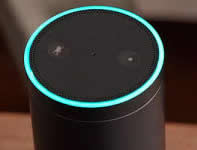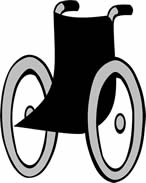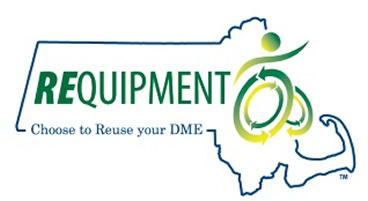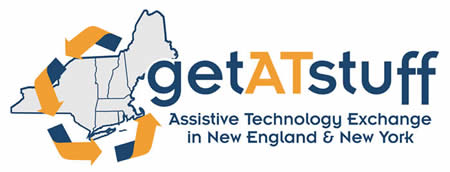MassMATCH Quarterly News: Winter 2017
In This Edition:
- Considering Amazon Echo or Google Home? Remember to Consider the Person!
- Amazon Echo as Assistive Technology, by Daniel Mayo, ATP
- Borrow What You Need! How the AT Regional Center in Pittsfield Helped Andrew Find His Voice
- Listening to Persons with Paralysis
- Job Announcement: REquipment Program Director
- REquipment Highlights
- Get AT Stuff Highlights
- Upcoming Events (opens the MassMATCH Events page)
Considering Amazon Echo or Google Home? Remember to Consider the Person!
 By now you’ve heard the news: Google has entered the “smart speaker” market with Google Home, a direct competitor to Amazon's Echo (aka "Alexa"). For two years Echo users have been “asking Alexa” for the weather, to set reminders, to play Amazon music or Audible books and to search information online. Now with Google Home, we can also “Ok Google” to reach the Web.
By now you’ve heard the news: Google has entered the “smart speaker” market with Google Home, a direct competitor to Amazon's Echo (aka "Alexa"). For two years Echo users have been “asking Alexa” for the weather, to set reminders, to play Amazon music or Audible books and to search information online. Now with Google Home, we can also “Ok Google” to reach the Web.
Priced well below $200, Amazon Echo and Google Home are potential game-changers for some individuals with disabilities. Both devices allow hands-free always-“listening” access to internet-based services and information. Equally exciting, both can be used to create voice-controlled “smart homes” (“Ok Google, turn on the fan!”)
So how do you choose?
First, the rules of matching assistive technology (AT) with a person remain. Are these the right devices for the user? While the Echo and Home are exciting for everything they can do, they are limited in their options for access. “Voice control does not work for everyone,” Cathy Bly, Coordinator of the MassMATCH AT Regional Center in Boston, reminds us.
MassMATCH Quarterly spoke with Cathy Bly about these new smart speaker assistants, and also Eric Oddleifson, Assistant Vice President of Assistive Technology and Community Support Services at Easter Seals-MA which operates the Boston AT Regional Center (ATRC). MassMATCH funds two ATRCs in Massachusetts to help persons with disabilities, family members, educators, therapists and anyone interested to learn about and make informed assistive technology decisions. Although the centers do not yet have Google Home for loan or demonstration, Cathy and Eric provided insights about this emerging new consumer-tech trend and helped us keep in mind real-person usability.
Enthusiasm for the Echo, and potentially now the Home, reminds Eric of when the iPad was introduced and what happened with AAC (speech generating devices). “Before the tablets and smartphones, there were only stand-alone devices for communication. Then came along these mobile devices that could do so many things with apps. And because they could do so much, many people--and often school systems--believed they could serve everyone. But that’s just not the case.”
With smart speakers, a user’s speech must be loud and clear enough for Echo or Home to respond. Echo doesn't work if Alexa doesn't understand you. In this video demonstrating the hearing limitations of Amazon Echo and Google Home, the reviewer notes that if you ask the speaker to play music and the volume is loud, it may not hear your request to shut off!
So far the Echo appears to be popular for persons with visual impairment, observes Cathy Bly who has a visual impairment herself. “I have friends using Amazon Echo Dots all over their homes [the $50 version of the Echo]. They love them,” she says. “They are also popular with some people with physical disabilities.”
Indeed, one longtime MassMATCH enthusiast recently overheard her husband--who has a spinal cord injury--talking to someone in another room. She asked him who was on the phone and was astonished to learn it was his new Echo Dot reading him a book. “I didn't know anything about it,” she said with delight, “he got it set up himself!”
Not everyone feels this way about set up, however. Eric reports it's one thing to connect the Echo to your Amazon Audible account or a streaming music service and quite another to configure it for environmental control. “It's really intensive,” he says. Eric worked for years as an Easter Seals AT specialist and is well-versed with configuring solutions for environmental control. “The older model Environmental Control Units can cost thousands of dollars. Now consumer products are making environmental control within reach for more people. But there are still limitations.”
The ads, understandably, make it look easy. “Ok Google, turn on the lights!” Yet neither Google Home nor Amazon Echo offers these “skills” right out of the box. They must be configured with additional products (“third-party hardware”) such as Philips Hue or Insteon. For a smart speaker to understand which Philips Hue lights to turn on, a user must “create groups” (of lights) to be triggered by appropriate spoken commands. If you dread your son’s Xbox, this might not be for you (or get him to do it).
Each of the third-party products for environmental control is configured on its own app to communicate with Home or Echo, so your smartphone can get complicated. And they don’t have too many commands to choose from (you have to use the word “trigger” if you want to use Philips Hue lighting on Echo).
That’s where the old-school Environmental Control Units (ECUs) will always have their market (as will the non-tablet AAC devices), Eric reminds us. “They are designed to be customizable for persons with disabilities.”
Cathy Bly agrees, “It’s important that people know we have a lot of options for controlling the environment at the ATRC. We have switch access for those who don’t speak, including sip and puff options. These can connect to a computer for controlling appliances or with a Samsung tablet and the Anymote app for controlling a T.V. There are also other options for voice control. We are here to help people learn about these options, considering their unique abilities, goals and needs.”
Interested in learning more about Amazon’s Echo for environmental control? The ATRC in Boston has the Insteon Hub starter kit available for demonstration with Amazon’s Echo. Insteon expands Echo’s “skills” by allowing users potential voice-control of lights, thermostat, fan, security camera, and more (it can also provide motion-sensor control without Echo).
If you’d like to try out Amazon Echo on its own, Boston has it in the loan program for anyone to borrow for up to four weeks. (Pittsfield has Echo for demonstration only.) Google Home is currently on the ATRC "wish list."
Finally, for a feature and "skills" comparison of Amazon Echo with Google Home, check out this thorough review from CNET (spoiler: Amazon Echo wins for environmental control, Google Home for entertainment).
Reminder: MassMATCH makes no endorsement, representation, or warranty expressed or implied for any product, device, or information set forth in this email or on its website. MassMATCH has not examined, reviewed, or tested any product or device here referred to.
Amazon Echo as Assistive Technology
by Daniel Mayo, Director of the MassMATCH AT Regional Center in Pittsfield (operated by UCP-Berkshire)
 The Amazon Echo is a great example of a consumer product with assistive technology implications. The Echo is a stationary speaker and virtual assistant that you can control by using your voice. The Amazon Echo comes pre-programmed to answer to the name “Alexa.” The name “Alexa” must be spoken each time before a question is asked.
The Amazon Echo is a great example of a consumer product with assistive technology implications. The Echo is a stationary speaker and virtual assistant that you can control by using your voice. The Amazon Echo comes pre-programmed to answer to the name “Alexa.” The name “Alexa” must be spoken each time before a question is asked.
Users can ask Alexa questions such as “What time is it? “What’s today’s date?” or “What is the weather like today?” Alexa can also add events to a user’s calendar and set up reminders as well help them keep track of their day. You can create a shopping list as you run out of things. Just ask Alexa to add an item to your shopping list, and when you’re at the store open the Echo app to find your list. Never forget the milk again.
For some users, the ability for Alexa to play music or audiobooks is an important feature. Music playing through a room can be calming and relaxing for some people. For users who may no longer be able to see print, the ability to get audio books and new and weather headlines may be just what they are looking for.
Alexa really comes into her own as assistive technology when you add connected devices like the Belkin WeMo and Phillips Hue. A user in bed or a wheelchair can use just voice commands to control devices. Lights can be turned on and off. A fan or air conditioner can be connected and turned on and off so a user can independently control their environment. Smart switches and thermostats can be added to Alexa to be voice controlled.
Using Alexa, you can place orders for items using just your voice. Any items available on Amazon.com can be ordered using Alexa. For users with mobility issues this can be much easier than going to the store or waiting for a family member or care taker to pick up items for you and gives them some independence back.
The Amazon Echo was developed to make everyone’s lives easier. For Assistive Technology professionals, we see how a consumer product can be adapted for use with individuals with disabilities. The Amazon Echo can create independence for many user at a fraction of the price of traditional Environmental Control Units.
For comments or questions please email the author, Daniel Mayo, at dmayo@ucpberkshire.org.
This article was first published March 18th, 2017 at the UCP-Berkshire Assistive Technology Blogs
Borrow What You Need!
How the AT Regional Center in Pittsfield helped Andrew find his voice
Andrew Pellerin enjoying his TouchChat communication device |
||
It's not unusual for insurance providers to take months approving assistive technology for their beneficiaries, and delays often result in a host of problems for people who need the equipment. But what if the recipient is a two-year-old child with language delays and every month counts? Such was the case this past year when Andrew Pellerin was prescribed a communication device by the Boston Children’s Hospital Speech-Language Pathology Program.
His mom, Jill, had been grateful to find the speech program at Children’s Hospital. A neurologist at Bay State Medical Center had recommended it after an MRI revealed Andrew had experienced a pediatric stroke. At Children's, Andrew was evaluated for AAC (augmentative and alternative communication) and the communication device TouchChat was prescribed and provided for a one-month loan. Now Andrew could move forward with his communication development, gain new ways to express himself, and his parents could better grasp more of who he is and how much he understands.
Learning to use the TouchChat, however, was a predictably slow process for the two-year-old. Initially, Andrew did not understand the difference between the TouchChat and any other iPad; he saw it as a toy and not a communication tool. To figure out what Andrew wanted to eat for snack, Jill had become accustomed to lining up options and asking him to choose, an arduous process she was ready to end. One month with the device, however, was not long enough for Andrew to learn to make selections or satisfy insurance requirements.
Indeed, Jill's insurance required that Andrew “show progress” with his loaner TouchChat before they would authorize a purchase. “It was ridiculous,” reflects Jill. “He was supposed to be able to approach the device and make a request before they would approve it! There were so many concepts he’d have to know to make that happen. And he was two!”
Jill was crestfallen. Andrew would lose access to his communication device. All two-year-olds need to keep their momentum with communication and social/emotional development, but the urgency is particularly great for a toddler who has survived a stroke. Children's Hospital needed their device back, yet losing ground for Andrew was not an option.
It took more than eight months, but in the end, Jill succeeded in getting Andrew approved for his own AAC device. She understood the stakes were high and refused to give up. When her sister recommended she try United Cerebral Palsy-Berkshire, she lost no time contacting them.
UPC-Berkshire partners with MassMATCH to operate an AT Regional Center (ATRC). Here anyone can learn about and borrow assistive technology, including options for AAC. “We were happy to arrange a loan of TouchChat configured to Andrew’s needs,” Dan says. “It’s what we're here for.”
AT device loans are free at the ATRCs. They are normally provided for two to four weeks at a time, but often they are extended when no one is on the device waiting list. In Jill's case, Andrew was able to borrow the TouchChat until his own insurance came through. “I don’t know what we would have done without Dan Mayo,” she says. “If it wasn't for UCP, Andrew wouldn't be where is now with language.”
Today Andrew is three years old and attends preschool. "He's become so independent with his device, his teachers are delighted," Jill reports. "He uses it to select snacks and meals. And he uses it to tell me 'NO!' like any three-year-old. I worked with him continuously and having that device the whole time was critical. Without the TouchChat I don’t think we’d know how much Andrew can understand and learn. It’s just amazing to watch him grow.”
Listening to Persons with Paralysis
Regional focus groups identify the need for a surprising new initiative
 This winter, MassMATCH had the opportunity to apply for a grant from the Christopher and Dana Reeve Foundation. Their "High Impact Innovative Technology Assistance Grants" are available to state AT Act programs (MassMATCH in Massachusetts) and provide up to $75,000 for projects that improve the quality of life for persons with paralysis. For most of us, “Innovative Technology” brings to mind high-technology such as robotic arms, exoskeletons, and smart homes. So imagine our surprise when focus groups in Central and Western Massachusetts instead asked for something relatively basic: access to wheelchair accessible scales and digital pressure mapping.
This winter, MassMATCH had the opportunity to apply for a grant from the Christopher and Dana Reeve Foundation. Their "High Impact Innovative Technology Assistance Grants" are available to state AT Act programs (MassMATCH in Massachusetts) and provide up to $75,000 for projects that improve the quality of life for persons with paralysis. For most of us, “Innovative Technology” brings to mind high-technology such as robotic arms, exoskeletons, and smart homes. So imagine our surprise when focus groups in Central and Western Massachusetts instead asked for something relatively basic: access to wheelchair accessible scales and digital pressure mapping.
To gather ideas for the grant proposal and learn about needs, MassMATCH first met with its AT Advisory Committee made up of persons with disabilities, family members, professionals and agency personnel. Next the program teamed with the Greater Boston Spinal Cord Injury Association, the Center for Living and Working in Worcester (an Independent Living Center), and United Cerebral Palsy-Berkshire to hold focus groups across the state. With each group, MassMATCH was careful not to introduce ideas already generated, and instead hear what came to mind directly from regional participants.
Brainstorming conducted with the AT Advisory Committee suggested we consider improving access to mobile technology, such as tablets, for social connection. That need was later echoed at the first focus group held at Spaulding Rehabilitation in Boston (in addition to voice-activated environmental control). It wasn’t until we traveled west that the message dramatically shifted. Focus group participants at the Center for Living and Working in Worcester, and at United Cerebral Palsy-Berkshire in Pittsfield, each independently raised a different frustration: “It's been 25 years since the passage of the ADA and I still have nowhere to go to get weighed!” (Worcester); “I have to go to the scrap metal yard to use their scale” (Pittsfield); “My doctor’s office can't weigh me. I go to the post office and UPS!” (both Pittsfield and Worcester).
In Pittsfield, the need for digital pressure mapping dovetailed the need for accessible scales; two participants had spent weeks of their lives confined (inpatient and home) due to pressure ulcers. Their message was emphatic: monitoring their weight, seating and positioning was foundational to their health, independence and capacity to get into the community. Yet they did not have access to the tools to do so.
MassMATCH conducted a follow-up survey with spinal cord injury support group members to better gauge this regional access problem. Respondents in Pittsfield and Springfield (21 in total) reported limited or no access to digital pressure mapping and wheelchair accessible scales. 42% reported they don't get weighed, and 21% get weighed less than once each year. 31% had never used digital pressure mapping technology and 47% report using it just once in their lives. Significantly, 94.7% wanted better access to accessible scales and pressure mapping.
“It's about the amount of time during the day you can sit up,” a participant in Worcester explained. “We've held birthday parties for grandchildren in our bedroom when my husband couldn't sit up in his wheelchair. Good seating and positioning means you're in your community longer. It's why I want to use a pressure map at home, to figure out what works!”
In Pittsfield, one participant said he needed his weight to properly adjust his wheelchair cushion and be sure he didn't exceed its limitations. Another said he needed his weight to be fitted properly for adaptive recreation equipment such as skis and handcycles. Another participant would like to use pressure mapping technology with adaptive recreation equipment to better understand the potential impact to his body and explore seating and positioning options that could extend those activities.
In response to this feedback, MassMATCH has proposed "The Weight and Seating Independence Project." If funded, the project will install wheelchair accessible scales in Independent Living Centers in Central and Western Massachusetts. It will also provide portable scale options for borrowing through the MassMATCH Device Loan Program. In addition, digital pressure mapping technology (PMT) will be available for borrowing by individuals, families and clinicians. Trainings on the use of PMT will be offered during the grant-funded period and ongoing device demonstrations and device loans will be available from MassMATCH well beyond the life of the grant (at UCP-Berkshire).
The Reeve Foundation makes it clear that “innovation” need not be cutting-edge technology. It may also be “using a new idea, method or device, or doing something in a new way.” In Central and Western Massachusetts persons with spinal cord injury are asking for something elemental: greater control of their bodies, their health, and the ability to problem-solve their own solutions. If successful, MassMATCH's innovation will be the provision of this equipment to individuals on their own schedules and in their own environments.
Cross your fingers. Grant awards are announced February 14th, 2017!
Job Announcement: REquipment Program Director
REquipment, Inc. regrets the recent departure of Chuck Smith! His position as Program Director is now available.
REquipment Program Director Job Description
The REquipment Program Director provides overall management of the REquipment program, a durable medical equipment (DME) and assistive technology (AT) reuse program serving people with disabilities and seniors across Massachusetts. The Program Director has direct responsibility for operations, marketing/outreach, and training to ensure high program quality and satisfied users. S/he is a member of the senior management team and oversees direct and indirect partner staff to ensure they achieve program quality and service goals.
The position is based in the Worcester area and statewide travel is required. Qualifications sought from the successful applicant include a bachelor's degree in a human services field and 5-10 years of work experience with program implementation and staff supervision. A strong commitment to the program mission, excellent interpersonal and communication skills, in-depth knowledge of disability supports and services, and a consumer-controlled philosophy are a must. Personal or professional experience with DME and/or AT preferred.
For the complete job description and to apply, please contact Karen Langley, klangley@dmereuse.org.
REquipment Inventory Highlights

REquipment provides refurbished, gently-used medical equipment to adults, children and seniors throughout Massachusetts. Devices are provided free of charge. As of this writing, items available at the REquipment inventory include:
- 1 Pediatric walker by Guardian in Worcester
- 1 Rolling Activity Chair (for a child) in Worcester
- 1 Gait trainer by Rifton (for a child) in Worcester
- 4 Manual lifts (for adults) in Worcester
- 1 Heavy duty Trapeze (for bariatric adult) in Canton
- 2 Trapeze lifts (for adults) in Worcester
- 1 Hemi walker by Guardian (for an adult) in Worcester
- 1 Jenx Giraffe (for a child) in Worcester
- 1 Winnie Walker Go-Lite by Drive Medical (for an adult) in Worcester
- 1 Rolling shower chair (for an adult) in Worcester
- 1 Sliding shower chair with back (for an adult) in Canton
- 1 Transfer shower/tub bench by Carex (for an adult) in Worcester
- 1 Prone stander by Lecky (for a child) in Canton
- 3 Lecky prone standers (size 2 for teen/small adult) in Worcester
- 1 Stander with Tray (Marvel Free Stander) by Drive Medical (for child) in Worcester
- 1 Tumble Forms Tri-Stander by Tumbleform (for a child) in Worcester
- 1 Invacare Hemi Height manual wheelchair (for an adult) in Worcester
- 1 Invacare Hemi Height folding wheelchair (for an adult) in Worcester
- 1 Pediatric Wheelchair (TriPod LT) in Pittsfield
- 1 Quantum Tilt in Space Wheelchair (for an adult) in Amherst
- 1 Quickie2 Wheelchair (for an adult) in Canton
- 1 Quickie Tilt (Zippie Tilt) for a child in Canton
- 1 Tracer SX5 Reclining Manual Wheelchair (for an adult) in Canton
- 2 Iris Tilt-in-space manual wheelchairs (for adults) in Worcester and Canton
- 1 Solara 3G Tilting Manual Wheelchair (for adult) in Worcester
- 2 Transport Wheelchairs (for an adults) in Worcester
- 1 Jazzy 600 power wheelchairs in Amherst
- 1 Jazzy basic power wheelchair (for an adult) in Worcester
- 1 Hoveround MPV5 power wheelchair (for an adult) in Worcester
Have equipment to donate? Learn more at this REquipment webpage.
GetATStuff Highlights

The Assistive Technology Exchange in New England and New York is the "Craig's List" for AT. Currently there are dozens of items posted for sale or free.
As of this writing, GetATStuff highlights include:
- 3 Vision-related items, including a Juliet Pro Braille Embosser for $1,500 OBO in Providence, RI.
- 1 Hearing-related item: a Superprint 4425 TTY for $300 OBO in North Providence, RI.
- 1 Servox talking device for $280 OBO in Delanson, NY.
- 50 Mobility, Seating, and Positioning related items, including a FREE ceiling lift system in Waltham, MA.
- 10 Daily Living related items, including a XL Pivot Bath Chair for FREE in Charlestown, MA.
- 5 Environmental Adaptation related items including an electric sit to stand for $600 OBO in Norwich, CT.
- 11 Transportation and Vehicle Modification related items, including the PHC-3 Portable Hand Controls for $200 OBO in Pepperell, MA.
- 4 Computer-related items, including a Footime Foot Mouse with programmable pedal for $75 OBO in North Providence, RI.
Go to GetATStuff to search items by category or geography or to list what you need.
Learn about additional AT reuse sites.
